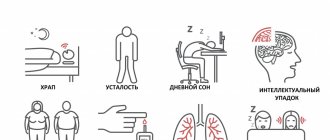Definition
Most adults require about 7-9 hours of sleep. However, there are also individual variations. For example, some may only need 6 hours of sleep, while others may need up to 10 hours.
Long naps usually do not affect the health of people who need that extra hour or two of sleep. Likewise, this does not apply to the extended sleep that is needed when recovering from illness, extreme exercise, or travel-related issues such as jet lag.
Long-term sleep affects the health of people who regularly sleep more than their body needs, for example, for 11-13 hours.
Do you sleep a lot? Let's look at the reasons for long sleep
Daily sleep of more than 10 hours a day is considered a violation, especially if after it a person feels exhausted. This disorder is called hypersomnia , but many patients do not associate long sleep with any illness. However, if a long sleep does not end in morning fatigue, a 10-hour stay in bed is not a serious pathology.
A diagnosis prescribed by a somnologist will help you find out whether prolonged sleep is a disorder.
Prolonged sleep may be due to improper brain function. Therefore, the examination plan should include diagnostics of the functions of the central nervous system.
Why do people sleep a lot day and night?
The main reasons for prolonged sleep are:
- Stress;
- Excessive physical activity;
- Emotional exhaustion;
- Diseases of the heart and blood vessels;
- Injuries, tumors and diseases of the brain;
- Regular lack of sleep;
- Night insomnia;
- Depression;
- Elderly age;
- Pregnancy;
- Taking pharmacological drugs that affect brain function;
- Mental illnesses.
The diagnosis of “hypersomnia” is made if at least one of the listed reasons is present.
Long sleep - reasons
While occasional long naps are normal, regular long naps may indicate an underlying health problem.
There are several links between health conditions and long sleep periods.
Disturbed sleep cycle
Numerous problems can cause sleep cycle disturbances. Every night the body goes through four or five different cycles. Cycles are important to feel refreshed the next day. Interruptions in the sleep cycle can lead to drowsiness in some people. Such interruptions may occur due to:
- loud noise
- bright lights
- consuming caffeine before bed
- pain
- restless legs syndrome
- bruxism, or teeth grinding
Other conditions can also cause disturbances in the sleep cycle.
Narcolepsy
Narcolepsy is a sleep-related condition that can cause severe sleepiness throughout the day. The condition does not go away after a full night's sleep or with a nap during the day. Narcolepsy may also cause other sleep problems, in addition to physical and cognitive symptoms.
Hypothyroidism
Hypothyroidism
may also affect sleep patterns in some cases. An underactive thyroid gland can cause drowsiness even after a full night's rest. This may lead to daytime sleepiness. Other common symptoms of hypothyroidism include feeling cold, muscle weakness, and unexplained weight gain.
Obstructive sleep apnea
Obstructive sleep apnea can also cause sleepiness. With obstructive sleep apnea, a person stops breathing for a short period of time. This usually happens several times a night and each time disrupts the sleep cycle. This can lead to excessive daytime sleepiness and a need for more sleep to feel rested.
Other symptoms of obstructive sleep apnea include:
- difficulty concentrating
- memory problems
- headaches or dry mouth when waking up
- frequently waking up to urinate
Depression
The relationship between sleep problems and depression is bidirectional. As noted in one study, sleep disturbance is both a risk factor and a symptom of depression. Other research hypothesizes that many forms of sleep disorder are a risk factor for depression, including narcolepsy, circadian rhythm disorders, and insomnia.
Although it usually manifests as insomnia or difficulty falling asleep or staying asleep, hypersomnia can occur in some cases of depression. This may be due to a disrupted sleep cycle (leading to long periods of sleep to compensate for sleep loss) or problems such as inflammation. However, the exact reason remains unclear.
Use of drugs
Some medications can also cause excessive drowsiness as a side effect, which can lead to prolonged sleep. If excessive sleepiness due to medications is difficult to treat, you should talk to your doctor about adjusting your dose or switching to a new medication.
Idiopathic hypersomnia
In some cases, even after making a full diagnosis, doctors may not know the underlying cause of prolonged sleep. This is known as idiopathic hypersomnia. A person with this condition may simply have excessive sleepiness and sleep without any specific reason.
Consequences of the problem
This condition is undesirable for a person and carries with it a number of negative effects. First, there will be a change in processes such as concentration and performance. We will make mistakes due to inattention, hesitations in speech, we may get into an accident, drive through a station, we may read, but not understand what we have read. This is a dysfunction.
The next thing is a change in emotional state. We become irritable, touchy, women become tearful, some changes in behavior occur, for example, you can overeat during the day.
And thirdly, our victimization increases when we become exposed to the risks that we will be deceived, that we will be provoked into something, that we will be vulnerable under the influence of others.
Is it dangerous?
While occasional long naps are not necessarily harmful to health, complications from regular long naps can put other conditions at risk.
Researchers found that people who slept too much or too little were significantly more likely to be overweight or obese. The review found that there is also a link between regular long-term sleep and a range of complications, including high blood sugar and risk factors for cardiovascular disease. Risks vary by gender and individual factors.
I sleep a lot, apathy
Hello!
All the symptoms that accompany you indicate apathy. At the same time, you very accurately describe the situation in connection with which all this is happening to you: “I only think about my ex-wife and child.” You can't let go. It’s not just that the time when the difficulties you write about began almost exactly coincides with the moment of the divorce.
What's eating you? Why can't you let go of the past? It is important to work through all those emotions that have not found a way out. After all, it turns out that you almost immediately fell into apathy. Was there room for more active experiences of divorce? Or have you closed yourself off in your state of depression?
“I started eating and smoking a lot.” Eating is protection. As a child, food gave us the feeling that we were being cared for. Since then, food has given us a feeling of security. This also applies to cigarettes for the reason that a cigarette is also consumed by mouth. The family is the unit of society. People unite in order to be strong together, to feel reliability and warmth. And now you are trying to regain all these sensations. Apathy and some things that accompany it help you with this. The reason, of course, is not resolved. However, this is your way to cope with the stress of divorce, which you still cannot survive and work through within yourself.
“Very often I have the same dreams, colorful ones, in which I experience an incredible feeling of bliss.” What exactly are you dreaming about? Just a feeling of pleasure or are there specific images? What dream repeats itself? “I can fall asleep anywhere, anytime.” You know, this is not surprising. If in reality you are deprived of that feeling of bliss that accompanies you in a dream, your natural desire is to sleep all the time. It is unlikely that anyone will like to experience the emptiness that you probably feel while awake instead of bliss.
It seems like all the fun has gone out of your life along with your family. You have lost not just your family, but something important in yourself along with it. And now look for it both in your dreams and in food. It’s not for nothing that you celebrate these very moments amid the indifference that surrounds you.
It is important for you to restore connection with yourself and gain internal reserves so as not to look for a replacement for what was lost. Or maybe there is an opportunity and desire to restore family relationships?
“I dread to think what will happen if I get a job again.” How long have you not worked? The whole year after the divorce or less? For what reason did you leave? Was the reason for your condition or did it come after your dismissal? And yet, I would recommend that you try to get a job. If it doesn't work, you can always leave. Refusal to bring something new into life is unlikely to help your situation. So you will simply “eat” yourself. So you are currently stewing in your own juice. The lack of social life makes the situation worse. Or is it about the fact that you can’t force yourself to do anything at all?
If you would like to explore the situation in more detail, please contact us for advice.
Best regards, Love.
How to prevent long sleep
Sleep can fuel habits that can cause long periods of sleep. For this reason, it is important to break the cycle and return to a normal sleep pattern. How to do it:
Set an alarm
Setting an alarm for the same time every day helps the body regulate its habits and return to its natural rhythms.
Don't hit the snooze button
Getting out of bed completely will help wake up your body and prevent you from falling back asleep.
Avoid daytime naps
Some people who sleep long hours at night may benefit from avoiding naps during the day. Napping can disrupt the body's sleep patterns and promote prolonged sleep. On the other hand, some may find that a short nap of just 10-20 minutes helps them feel rested.
Avoid light before bed
Bright, short-wavelength light from electronic devices stimulates the brain, causing you to stay on your feet longer than necessary.
For people whose bodies are sensitive to this light, it is best to avoid using electronic devices and all light sources before bed.
Keep a sleep diary
Your doctor may ask you to keep a sleep diary, in which you will need to detail your usual sleep habits and daily routine in a journal, including when you sleep and when you are awake.
Keeping a sleep diary can provide your doctor with the information needed to diagnose any underlying health problems.
How to normalize sleep
To get rid of daytime sleepiness, you will have to make some effort. In some cases, it is enough to normalize the regimen, in others it is necessary to undergo complex, long-term therapy.
Recommendations in the absence of pathologies:
- Do not rest during the day, go to bed early in the evening, but do not sleep much. To recover after a heavy load, 12 hours is enough, no more. But the next day 8 hours will be enough.
- There must be a suitable place for a night's rest. Comfortable pillow, washed bedding, no artificial light. For good sleep, choose a position on the right side, for good rest - on the left. To relax the spine and nervous system, fall asleep on your back.
- Don't sleep with TV on, avoid noise. Before vacation, do not use your phone, tablet, or surf the Internet.
- To fall asleep faster and relax, it is recommended to take a warm bath and drink chamomile tea. In the morning you should get up no later than 8 o’clock, wash with cool water, and brew a cup of green tea.
- Monitor your nutrition and diet throughout the day. Do not overeat in the evening, do not snack at night. A full stomach provokes nightmares and causes drowsiness during the day.
If the condition does not normalize, take special pharmaceutical or folk remedies.
Ways to normalize sleep
The main reason why the body takes more time than it should to recover at night is poor quality sleep. There are a number of activities that can help improve sleep:
- Developing and maintaining a daily routine. Go to bed early, get up earlier in the morning. Do this at the same time.
- Take a warm bath with calm music before bed. Avoid watching television, surfing the Internet, and playing computer games in the evening. The best thing is to read a book.
- Maintaining an active lifestyle. Exercise in the morning (preferably with a jog), yoga before bed.
- Serious matters that may be accompanied by stress should be planned only for the first half of the day.
- Proper nutrition. You should not have a heavy dinner before bed, especially if the menu includes fatty, smoked, and spicy foods. You shouldn’t go to bed hungry either; you can eat some vegetables and dairy products. You should not drink a lot of fluids in the evening so that you do not have to get up to go to the toilet at night. Do not drink coffee or tea before bed.
- Avoid drinking alcohol in the evening. The relaxing effect of alcoholic drinks is a myth.
- Monitor your sleeping conditions. Ventilate the bedroom, monitor the humidity in the room, buy orthopedic bedding.
USEFUL INFORMATION: Calculate the sleep phase: indicate the time of awakening to get enough sleep
Following these simple steps will help you get a good night's rest in about eight hours, which is normal.









